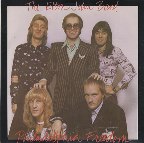It has been fairly well documented over the years that Elton John’s 1975 hit Philadelphia Freedom was written about the tennis player Billie Jean King, and that may well be the case as far as the singer of the song was concerned, but it’s not necessarily the case for the songs writer.
The year 1975 was a landmark year for Elton. Firstly, he became the first white English performer to appear on the TV show Soul Train, which he felt was an honour and at that time he performed Philadelphia Freedom and what was to be a future single, Bennie and the Jets. Secondly he became the first artist to enter the US charts at number one with the album Captain Fantastic and the Brown Dirt Cowboy.
Later that same year, Elton, whilst in the States, became good friends with Billie Jean King after meeting her at a party. Elton tried to attend as many of her matches as he could, and he promised King a song after she gave him a track suit. Elton and Billie Jean King would become icons of the gay and lesbian community, but at the time, they were both still in the closet, since athletes and entertainers faced a backlash if they revealed their homosexuality.
Billie Jean King was the first female to coach a team of men. Elton admired this and told her he wanted to write song for her and her World Teamtennis team who were known as the Philadelphia Freedoms. He told Paul Gambaccini that it was the only song he ever consciously wrote as a single. He told Ms King that he would have his lyricist, Bernie Taupin, write something appropriate.
Elton was a Philly and soul fan and particularly admired the Delfonics and the work of the Philly producers Kenny Gamble and Leon Huff. Even the opening line of the song, ‘I used to be a rolling stone’ echoed the sentiment of the Temptations’ Papa Was a Rolling Stone.
When Elton called Bernie and asked him to write a song called Philadelphia Freedom, Bernie retorted with, “I can’t write a song about tennis,” and he didn’t. According to Bernie, he said, “The song was inspired by the Philadelphia Soul sound of groups like The O’Jays and Harold Melvin & The Blue Notes, and also the American bicentennial in 1976 when the US celebrated 200 years of independence. There was also speculation at the time that the song was about Elton admitting he is gay because Philadelphia is the ‘City of Brotherly Love’.
Elton recorded a rough mix of the track at the Caribou Ranch studios and took it to Denver, Colorado where he presented it to Billie Jean at the venue where her team were playing. “He was so nervous that I wasn’t going to like it,” she admitted, “But I absolutely loved it. It’s just so thoughtful that that they wrote a song and dedicated it to me, it means so much.”
The song was released in March 1975 and credited to the Elton John Band. It debuted at number 53 in the States and within four weeks was number one. At home it reached number 12. Elton had chart domination in the States throughout the seventies but this didn’t always make him happy. He explained why in an interview with Melody Maker, “In America I’ve got ‘Philadelphia Freedom’ going up the charts again. I wish the bloody thing would piss off. I can see why people get sick and tired of me. In America I get sick and tired of hearing myself on AM radio. It’s embarrassing.” At almost five and a half minutes, it was one of the longest singles of that year and radio programmers hated it for its length. One national radio programmer declared that he would no longer play any Elton John song over four minutes long because they were screwing up his playlists. “I knew this would be a hit,” Elton said, “And was happy to screw the programmer by making it long, knowing he would have to play it anyway. ”
Elton always tried to make sure there the something ‘interesting’ on the B side of his singles, it was a way of trying to make them more valuable he once said. The flip side of this singe was a live duet of I Saw Her Standing There which Elton had recorded with his friend John Lennon. Elton had previously sung on Lennon’s Whatever Gets You through the Night.
Depending on where he was performing, Elton would sometimes alter the lyrics of the song, swapping Philadelphia for his present location. He would only do it if he could make it fit, so Cincinnati Freedom was perfect, however places like London or Paris just did not work.
